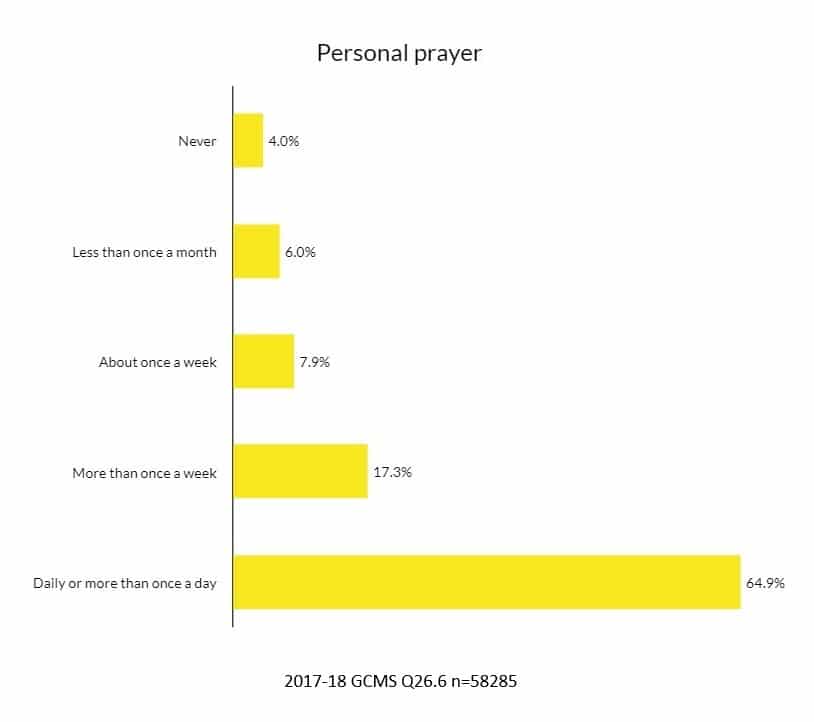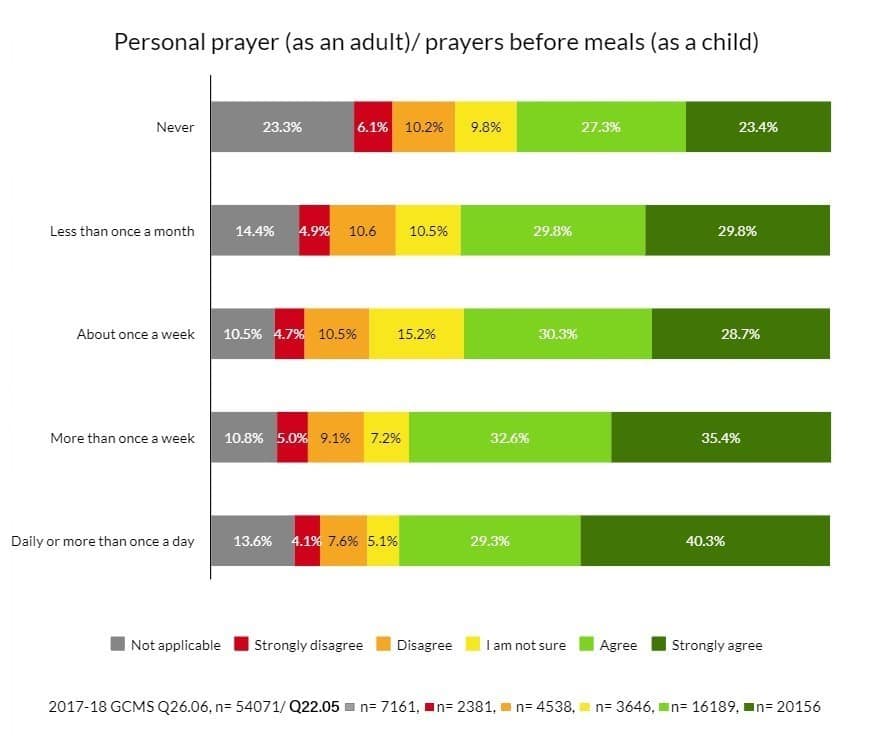While prayer has become a subject of scientific research, the findings of the 2017–18 Global Church Member Survey (GCMS) may surprise you. Prayer and healing go hand in hand; prayer is important for our overall health. Prayer is a vital part of spiritual growth. It connects us to our Heavenly Father and helps us grow in Christ (see Fundamental Belief #11 for more on this.)[1] Since prayer is such an important spiritual component, how do members of the Adventist Church engage in this practice?
The 2017–18 GCMS asked members about their participation and engagement in various spiritual practices. One area surveyed was how often Church members engaged in personal prayer (aside from prayer before meals). Overall, two-thirds (65%) of respondents reported that in the last year, they had engaged in daily (or more often) prayer. Another 17% reported that they had prayed more than once a week, while 8% prayed about once a week. It is clear that prayer is an important part of spiritual life for many Adventists around the world. Though these results of a clear majority are encouraging, what about the one-third of believers who do not pray daily? How are they able to survive in their spiritual battles? How do they meet their day-to-day challenges? And those who pray less than once a month or never (10%)—how can they be strong in the Lord? The data definitely appeal to every member, church leader, pastor, and parent to become an example in this area and keep the connection with Jesus strong.

A home makes every society and church what they are. Throughout her writings, Ellen White admonished parents not to neglect family prayer, as this is an important part of spiritual development for children.
Families Should Pray Together Every Morning and Evening—Family worship should not be governed by circumstances. You are not to pray occasionally and, when you have a large day’s work to do, neglect it. In thus doing you lead your children to look upon prayer as of no special consequence. Prayer means very much to the children of God, and thank offerings should come up before God morning and evening. Says the psalmist, “O come, let us sing unto the Lord: let us make a joyful noise to the rock of our salvation. Let us come before his presence with thanksgiving, and make a joyful noise unto him with psalms.” [2]
With this in mind, have you ever wondered how a family’s dedication to prayer and family worship impacts their children’s prayer life as they grow?

When the frequency of respondents’ engagement in personal prayer was cross-tabulated with how often the respondents’ families of origin had prayer before meals, the 2017–18 GCMS found that
- Respondents who agreed or strongly agreed with the statement, “Praying before meals was a habitual practice in my family,” were most likely to pray daily or more than once a day (70%).
- Similarly, respondents who agreed or strongly agreed that “praying before meals was a habitual practice in my family” were nearly as likely to report that in the last year, they had prayed more than once a week (68%).
- Interestingly, of those who reported that they had never engaged in personal prayer in the last year, over half (51%) agreed or strongly agreed that praying before meals had been important in their family of origin.
- Of those who reported that they had engaged in personal prayer less than once a month, an even higher percentage (60%) agreed or strongly agreed that “praying before meals was a habitual practice in my family.”
Overall, there appears to be a link between praying in one’s family of origin and engaging in prayer as an adult. However, the data does not show whether engaging in prayer at other times (such as part of family worship, devotions, bedtime prayers, etc.) influenced prayer habits as an adult. (This was not included in the scope of the 2017–18 GMCS.) However, the results point clearly to the correlation between prayer before meals in a parental home and the frequency of personal prayer in an adult life.
Parents are models for their children, including how their children develop prayer habits. As Ellen White wrote,
In every Christian home God should be honored by the morning and evening sacrifices of prayer and praise. Children should be taught to respect and reverence the hour of prayer. It is the duty of Christian parents, morning and evening, by earnest prayer and persevering faith, to make a hedge about their children. [3]
Prayer is often compared with a person’s breath. Can we live without breathing? Is it also not interesting that the apostle Paul called us to “pray without ceasing” (1 Thess 5:17 KJV)? Our spiritual growth and strength will multiply in geometric progression with the increased communion with Jesus. Let us highlight the importance of such time with Jesus to the Church members, and let us not neglect prayers in a family circle in our homes. They can have a long-life influence on our children and our own lives.
To learn more about prayer trends in the Adventist Church, check out a previous blog on the topic here.
Created in collaboration with the Institute of Church Ministry
Published by ASTR on 04-20-2022
[1] Seventh-day Adventist Church, What Adventists Believe about Growing in Christ. Retrieved from https://www.adventist.org/growing-in-christ/
[2] Ellen G. White, Prayer. pg. 189.1 Retrieved from https://m.egwwritings.org/en/book/87.1005#1015
[3] Ellen G. White, Prayer. pg. 190.5 Retrieved from https://m.egwwritings.org/en/book/87.1005#1015

